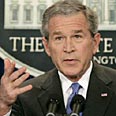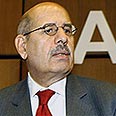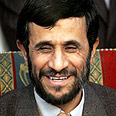


The decision by the International Atomic Energy Agency's 35-nation board sets the stage for future action by the top U.N. Body that could include economic and political sanctions. Still, any such moves were weeks if not months away, with two permanent council members - Russia and China - agreeing to referral only on condition that no council action be taken until at least March.
Iranian President Mahmoud Ahmadinejad ordered Iran's nuclear organization to end snap U.N. checks from Sunday in reaction to the U.N. Nuclear watchdog's decision.
"Because of the resolution of the IAEA which reports Iran to the Security Council the organization should stop voluntary implementation of the additional protocol and other cooperation from Sunday," Ahmadinejad said.
Javed Vaeidi, the deputy head of Iran's powerful Security Council, said in response that Iran would "immediately" set into motion steps to restart full-scale uranium enrichment and curtail the inspecting powers of the IAEA.
Washington compromised on a U.S.-Egyptian dispute over linking fears about Tehran's atomic program to a Middle East nuclear-free zone - and indirectly to Israel. Diplomats said the Americans accepted mention of such a zone in the draft referring Iran to the Security Council late in the night.
A copy of the confidential draft links the decision to ask for Tehran's referral to the country's breaches of the nuclear nonproliferation treaty and lack of confidence that it is not trying to make weapons.
A majority of board members back referral but possible delay had loomed after United States and Egypt tangled over linking the issue to long-standing Arab demands that Israel - generally considered a nuclear power - give up such arms.
Diplomats familiar with the issue said France, Britain and Germany - the three European nations formally submitting the U.S.-backed draft resolution calling for referral - had mediated between Cairo and Washington.
The diplomats, who demanded anonymity in exchange for discussing the negotiations, said U.S. Secretary of State Condoleezza Rice and Egyptian counterpart Ahmed Aboul Gheit also had been involved in trying to iron out language acceptable to both sides.
A Western diplomat at the meeting said the United States felt strongly about not linking its ally Israel to nuclear concerns in the Middle East when it considers Iran the real threat in the region. But the Americans agreed in the face of overwhelming support for inclusion of such a clause from its European allies spearheading the resolution.
'Serious concerns about Iran's nuclear program'
Egypt, whose support of the resolution is key to swaying other Arab board members to join in backing it, was looking to make the linkage to satisfy broad domestic concerns, a senior European diplomat said.
The resolution expresses "Serious concerns about Iran's nuclear program." It recalls "Iran's many failures and breaches of its obligations" to the nonproliferation treaty, and it expresses "the absence of confidence that Iran's nuclear program is exclusively for peaceful purposes."
It requests IAEA Director General Mohamed ElBaradei to "report to the Security Council" steps Iran needs to take to dispel suspicions about its nuclear ambitions.
Support for Iran at the Vienna meeting appeared to be limited as the clock ticked down on the issue of referral.
Cuba, Venezuela, Syria and a few other countries represented at the IAEA board meeting remained opposed. India was said to be leaning toward supporting referral.
Diplomats said support for Iran had shrunk among board members since Russia and China swung their support behind referral at a meeting with the United States, France and Britain - the other three permanent council members - earlier in the week.
'We must prevent Iran from developing nuclear program'
El Baradei has stressed that even if the issue is referred, the Security Council would not take up the issue before next month - a condition attached by Russia and China in exchange for their support.
Iran Saturday called leaders of the United States "Terrorists" and said the White House, not Iran, represents the "Axis of evil" in the world, the official Islamic Republic News Agency reported.
"Leaders of the U.S. are terrorists and the main axis of evil in the world," Defense Minister Mostafa Mohammad Najjar said.
German Chancellor Angela Merkel likened Iran's nuclear plans on Saturday to the threat posed by the Nazis in their early days.
Addressing the annual Munich security conference, Merkel said countries around the world had underestimated the Nazi threat as Adolf Hitler rose to power.
"Looking back to German history in the early 1930s when National Socialism (Nazism) was on the rise, there were many outside Germany who said 'it's only rhetoric - don't get excited'," she told the assembled world defense policy makers.
"There were times when people could have reacted differently and, in my view, Germany is obliged to do something at the early stages ... We want to, we must prevent Iran from developing its nuclear program."















